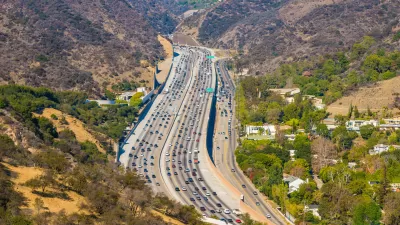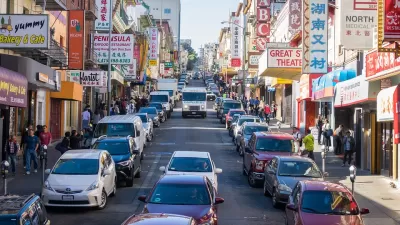Officials in San Francisco will be presented with reports today on possible ways to integrate congestion pricing and toll zones into the city. If approved, San Francisco would be the first city in the nation to implement congestion pricing.
"Charging people more for anything is always a tough sell. Talk about reaching deeper into people's pockets when the economy is in the tank is even more difficult."
"'We're going to have to get buy-in,' said Jose Luis Moscovich, executive director of the San Francisco County Transportation Authority."
"It's his agency that, with the help of a $1 million federal grant, has been studying the feasibility of congestion pricing in San Francisco."
"The idea will inch forward Tuesday, when the authority's directors - a group made up of the city's 11 elected members of the Board of Supervisors - will be presented with various pricing scenarios and toll-zone locations, and an analysis of the potential benefits and disadvantages."
FULL STORY: Planners to consider S.F. congestion charge

Manufactured Crisis: Losing the Nation’s Largest Source of Unsubsidized Affordable Housing
Manufactured housing communities have long been an affordable housing option for millions of people living in the U.S., but that affordability is disappearing rapidly. How did we get here?

Americans May Be Stuck — But Why?
Americans are moving a lot less than they once did, and that is a problem. While Yoni Applebaum, in his highly-publicized article Stuck, gets the reasons badly wrong, it's still important to ask: why are we moving so much less than before?

Research Shows More Roads = More Driving
A national study shows, once again, that increasing road supply induces additional vehicle travel, particularly over the long run.

Judge Halts Enforcement of Anti-Homeless Laws in Grants Pass
The Oregon city will be barred from enforcing two ordinances that prosecute unhoused residents until it increases capacity and accessibility at designated camping sites.

Advancing Sustainability in Los Angeles County Schools
The Los Angeles County Office of Education’s Green Schools Symposium brings together educators, students, and experts to advance sustainability in schools through innovative design, climate resilience strategies, and collaborative learning.

Using Old Oil and Gas Wells for Green Energy Storage
Penn State researchers have found that repurposing abandoned oil and gas wells for geothermal-assisted compressed-air energy storage can boost efficiency, reduce environmental risks, and support clean energy and job transitions.
Urban Design for Planners 1: Software Tools
This six-course series explores essential urban design concepts using open source software and equips planners with the tools they need to participate fully in the urban design process.
Planning for Universal Design
Learn the tools for implementing Universal Design in planning regulations.
City of Moreno Valley
Institute for Housing and Urban Development Studies (IHS)
City of Grandview
Harvard GSD Executive Education
NYU Wagner Graduate School of Public Service
City of Cambridge, Maryland
Newport County Development Council: Connect Greater Newport





























